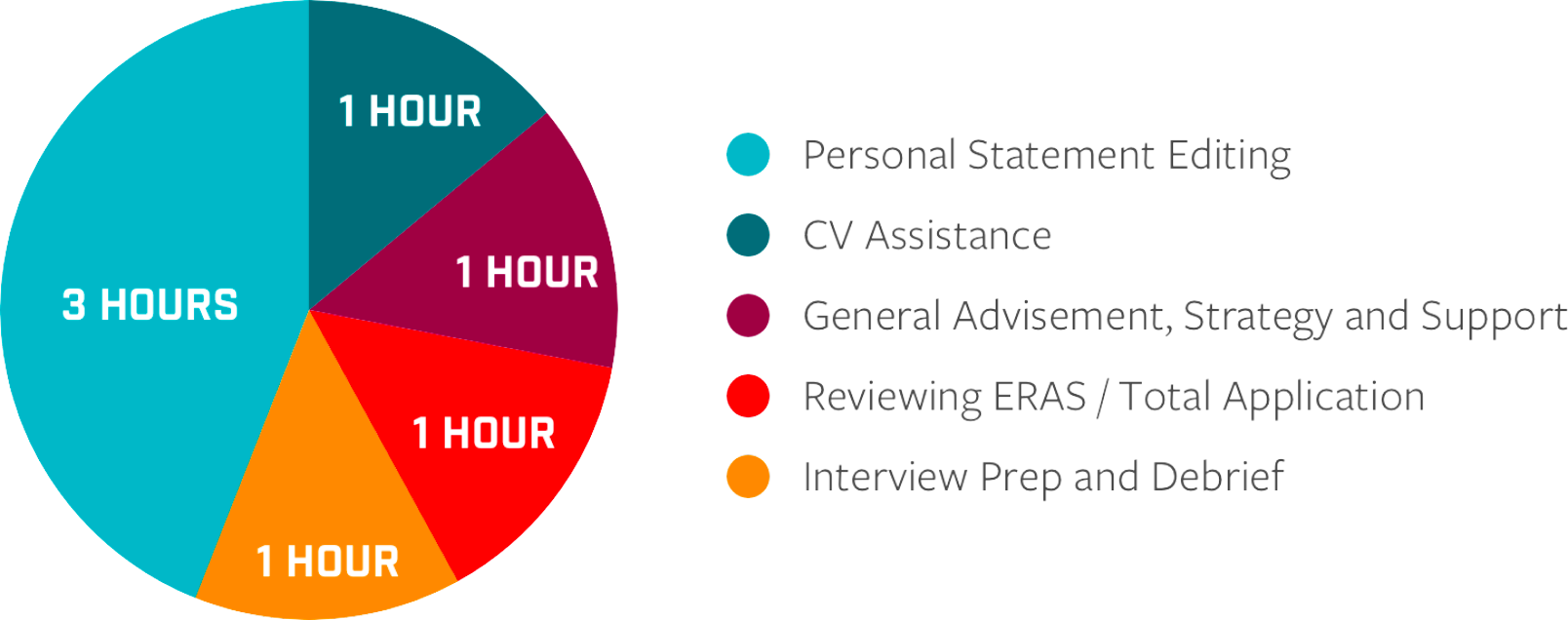Educational gaps for medical students are often periods of time during their training when they take a break from formal studies to engage in other forms of learning or take on new professional activities. Occasionally, there may be a hiccup in their trajectory and they need time off to address personal issues. Breaks can offer valuable opportunities for exploration and personal growth, or they may be necessary for remediation or personal wellness. Nevertheless, it’s important for you to address why you took time off so it doesn’t hinder your ERAS application in any way. In this post, I’ll go over common reasons medical students take a gap year, and offer ways to address any gaps in your ERAS residency application.
If you’re someone who needed to take time off from your studies, take heart. You certainly aren’t the only one with a gap in your educational record. Many students needed time away, often for one of the following five reasons. Does one of them describe you?
5 Common Reasons for Educational Gaps as a Medical Student
1. Health concerns, either for themselves or a loved one
This is by far one of the most common reasons students request a leave of absence. Personal health issues, including physical or mental health concerns that temporarily impede a student’s ability to continue with their studies, are important and should be addressed preemptively, before leading to further, worsened outcomes down the road.
In a similar vein, some students may choose to take time off to address family emergencies, marital crises, or significant life events that require their extensive attention and presence. Regardless of why you need the time away, please recognize that residency programs and directors realize that you are only human. Your health and mental wellness as well as that of your loved ones come first. Do not feel guilty about taking needed time off!
2. Research or educational opportunities
Some students choose to take a gap year in order to pursue research opportunities or further academic studies in a specific field of interest, such as completing a master’s or Ph.D. program. A secondary degree can help bolster the student’s application and make him or her more competitive in the eyes of their desired residency program.
Common secondary degrees outside of medicine include Masters of Public Health (MPH), Masters of Business Administration (MBA), and PhDs. Be aware of the time and monetary costs associated with these programs. Overall, additional qualifications can enhance an applicant’s expertise and future career prospects as long as his or her application is solid otherwise (an MPH will not cause a program director to overlook failing clinical grades or poor exam scores).
3. Health advocacy and nonprofit work
Some students become tired of the system and spend their time away engaging in health advocacy or working for nonprofit organizations. Doing so with a focus on healthcare can deepen a medical student’s understanding of the social determinants of health and healthcare disparities.
Many students use this time away to focus on international health issues and strengthen their CV by getting involved in global health initiatives and the care of underserved populations. They may join medical mission trips, work in impoverished communities, or participate in international health organizations to broaden their perspectives on global healthcare and cultural awareness.
4. Family planning or maternity/paternity leave
Medical students may need a leave of absence to prepare for the birth or adoption of a child, or to support a partner during maternity or paternity leave. The latter is partner dependent and certainly not as common, but I have seen it. It would be tough to experience your first year of parenthood while working 80-hour weeks in the hospital as an intern. Your partner will certainly appreciate a bit of help, so take the time off if you need it.
5. Experiencing burnout
Finally, healthcare worker burnout has been prevalent in the last decade and made into a “buzzword” topic since the start of the pandemic. Clinical rotations can be intense as a student, and certainly more so as a resident. Some students may find it helpful to have a longer break to address burnout or regain their enthusiasm and energy for their studies. In fact, even residents take leaves of absence due to burnout, often only returning once they are mentally and physically recovered.
Now that we’ve gone through the five common reasons for medical students to take a leave of absence, continue reading to get an idea of how to explain time off between school and residency. This is a common concern for many students and recent graduates, but keep in mind that program directors were once medical students and residency applicants themselves, meaning they, for the most part, will understand how life events and circumstances can lead to gaps in school.
Furthermore, PDs are generally more interested in your overall potential and skills rather than a specific period of time in your past. Of course, a pattern of failed coursework and multiple breaks for repeated remediations is very difficult to explain in a positive light—however, one brief stint is usually not a big deal. By approaching your explanation with honesty, positivity, and a focus on your readiness for intern year, you can effectively address any concerns a program might have about the gap in your education.
7 Tips for Handling Education Gaps on Your ERAS Application
1. Be preemptive.
Before taking your leave, consult with your medical school’s administration and academic advisors when considering a leave of absence. Each institution may have specific policies and procedures in place for granting and managing leaves, including timelines for returning to complete your medical education.
A well-planned leave of absence can offer students the time and flexibility they need to address personal matters or explore other opportunities while ensuring a smoother transition back to their medical studies in the future. Your school can offer guidance on timing, when to take the time off and how much time would be appropriate. Not to mention resources that can help with whatever you need the time off for.
If the gap year occurs at a specific point during your medical education, explain why you chose that particular time. Whether it was after completing medical school, during clinical rotations, or before taking the USMLE or COMLEX exams, discussing your timing can provide context for the decision and how it has positively influenced your preparedness for the residency program.
2. Ask your upperclassmen.
As with most things in medicine and healthcare, you are likely not the first. Connect with those who have had a similar experience.
Chat with upperclassmen who took time off and have had a similar experience to yours and see how it affected them during application and interview season. Get insight into how they addressed that period, you may hear issues similar to your own.
3. Be personal, honest, and transparent.
On your application and especially during your interview with the residency program, be honest about the reason for your gap year. Explain it on your terms. Own up to it and illustrate why you decided to take the time and how it ultimately helped you. Whether it was due to personal reasons (such as health issues, family commitments, or personal development), academic pursuits (such as additional coursework or research projects), or exploring other interests, be straightforward in your explanation and personalize it.
Residency committees appreciate honesty and integrity in applicants. Program directors are used to some exaggeration, but keep it honest and avoid using excess hyperbole when expressing your reasons for the time off. PDs recognize that for some students, there may have been breaks in their education that were out of their control such as sick family members that necessitate care, private health concerns, or personal burnout.
Be straightforward about the external factors that required time off to handle, explain how you dealt with them, and how you are a better trainee because of it. Then, no one can hold it against you. If you took an elective break, the same rule applies. Mention your reasons for electing time off with honesty and convey your thought process throughout the explanation.
4. Highlight your development and how the time off connects with your career goals.
If you were involved in any activities during your gap year that are directly related to your chosen specialty or field of study, make sure to highlight them in your application. This could include participating in research projects, clinical experiences, volunteer work in healthcare settings, or taking additional courses to strengthen your knowledge and skills. For example, if you participated in research, highlight your ability to conduct literature reviews, design experiments, and analyze data.
Demonstrating growth in relevant skills will reassure program directors of your preparedness for the residency. Better yet, explain how your experiences align with your long-term career goals and how they have influenced your decision to pursue a residency in a specific specialty. Discuss how the gap allowed you to gain insights into your field of interest, solidify your commitment, and enhance your understanding of the specialty’s demands.
5. Showcase transferable skills on your ERAS application.
Identify and highlight the skills you gained during that time. Transferable skills like communication, leadership, problem-solving, or project management can be valuable assets in any job, especially residency. Perhaps mention how the break helped you gain clarity on your career goals or allowed you to explore new interests that led you to the position you are applying for. Emphasize your readiness and enthusiasm to return to a residency in healthcare given all of your personal growth.
6. Address your academic performance.
If your gap year was taken to address academic concerns or improve your performance, it’s essential to address this upfront. Explain the specific steps you took to address any academic challenges, such as seeking tutoring, attending academic workshops, or retaking relevant coursework. Show that you have overcome the obstacles and are now better prepared for the rigors of the residency program by outlining how well you did with remediating that clinical course or scoring in the top 90th percentile of that national exam.
Lastly, emphasize the personal growth and maturity you experienced during your time away. Describe how the challenges you had during that time have positively impacted you as an individual and how you have become better equipped to handle the stress, responsibilities, and challenges of a residency.
7. Speak with a residency advisor.
A residency counselor can be a valuable resource in helping you explain a gap year on your application in a positive and effective manner. We can help you craft a personal narrative and create a compelling and coherent story about your gap year. This can help you identify the reasons behind taking the gap year and how it has contributed to your personal and professional growth.
A residency advisor will talk you through the potential concerns that admission committees might have about your gap year, and the counselor can help you proactively address them. This could include explaining why you chose to take a gap year, how you stayed academically engaged during the break, or how the experiences enriched your understanding of medicine. Also, it’s important to understand that each residency program may have different priorities and values.
If you’re interested in working with a residency counselor, the chart above shows a sample breakdown of how you can use your time together. In addition to general advisement and support, a residency advisor can assist you in customizing your application and personal statement to align with the specific program’s goals, making it more likely to resonate with the selection committee. And lastly, a residency advisor can help refine your communication skills and provide guidance on interviews, ensuring that your explanations are clear, concise, and impactful.
Further Reading
Remember that taking a gap year is not uncommon, and many residency programs are understanding of the various reasons applicants may choose to do so. By providing a transparent and thoughtful explanation of your time off, you can help program directors see the value of your experiences during the gap year and how they have contributed to your development as a future resident.
Overall, your explanation of the gap year should be a well-thought-out narrative that showcases your growth, experiences, and readiness for the residency program. By presenting your experiences in the most favorable light, you can significantly increase your chances of standing out as a strong candidate. Addressing the gap proactively and confidently, you can present yourself as a top candidate for the program. You can do it on your own, but we are always around to help!
If you’d like to find more (free!) residency tips from Blueprint tutors, check out these other posts:






